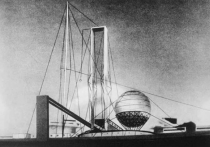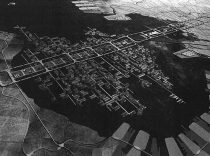Movement

Constructivism
Constructivist architecture was a form of modern architecture that flourished in the Soviet Union in the 1920s and early 1930s. It combined advanced technology and engineering with an avowedly Communist social purpose. Although it was divided into several competing factions,

Constructivism
Constructivist architecture was a form of modern architecture that flourished in the Soviet Union in the 1920s and early 1930s. It combined advanced technology and engineering with an avowedly Communist social purpose. Although it was divided into several competing factions,

Metabolism
Metabolism was a post-war Japanese architectural movement that fused ideas about architectural megastructures with those of organic biological growth. It had its first international exposure during CIAM’s 1959 meeting and its ideas were tentatively tested by students from Kenzo Tange’s

Metabolism
Metabolism was a post-war Japanese architectural movement that fused ideas about architectural megastructures with those of organic biological growth. It had its first international exposure during CIAM’s 1959 meeting and its ideas were tentatively tested by students from Kenzo Tange’s

Futurism
Futurist architecture is an early-20th century form of architecture born in Italy, characterized by strong chromaticism, long dynamic lines, suggesting speed, motion, urgency and lyricism: it was a part of Futurism, an artistic movement founded by the poet Filippo Tommaso

Futurism
Futurist architecture is an early-20th century form of architecture born in Italy, characterized by strong chromaticism, long dynamic lines, suggesting speed, motion, urgency and lyricism: it was a part of Futurism, an artistic movement founded by the poet Filippo Tommaso

Brutalism
Brutalist architecture flourished from 1951 to 1975, having descended from the modernist architectural movement of the early 20th century.[1] The term ‘Nybrutalism’ (New Brutalism) was originally coined by the Swedish architect Hans Asplund in 1950 to describe Villa Göth in

Brutalism
Brutalist architecture flourished from 1951 to 1975, having descended from the modernist architectural movement of the early 20th century.[1] The term ‘Nybrutalism’ (New Brutalism) was originally coined by the Swedish architect Hans Asplund in 1950 to describe Villa Göth in

Structuralism
Structuralism is a movement in architecture and urban planning evolved around the middle of the 20th century. It was a reaction to CIAM-Functionalism (Rationalism) [1] which had led to a lifeless expression of urban planning that ignored the identity of

Structuralism
Structuralism is a movement in architecture and urban planning evolved around the middle of the 20th century. It was a reaction to CIAM-Functionalism (Rationalism) [1] which had led to a lifeless expression of urban planning that ignored the identity of

Suprematism
Suprematism (Russian: Супремати́зм) is an art movement, focused on basic geometric forms, such as circles, squares, lines, and rectangles, painted in a limited range of colors. It was founded by Kazimir Malevich in Russia, around 1913, and announced in Malevich’s

Suprematism
Suprematism (Russian: Супремати́зм) is an art movement, focused on basic geometric forms, such as circles, squares, lines, and rectangles, painted in a limited range of colors. It was founded by Kazimir Malevich in Russia, around 1913, and announced in Malevich’s